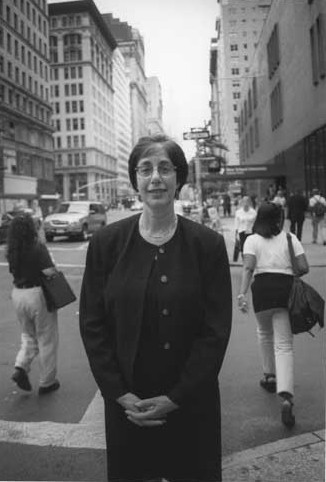Marilyn Shafer
|
Marilyn Shafer Born November 24, 1939 Manhattan Civil Court Judge New York, New York |
Career Overview Appointed to Manhattan Civil Court March 1988 Elected 1993 Appointed to New York Supreme Court June 1999 (ten year term)
|
In an unexpected application of the US Supreme Court decision that affirmed the right of the Boy Scouts of America to bar gay men from membership and leadership roles, Judge Shafer ruled in 2006 against the organization's attempt to claim it excercised no discresion in hiring of local Scout Maasters, thereby attempting to avoid a negligence suit brought against it by a man who claimed to have been sexually abused by his Scout Master while a teenager.
Interview with Marilyn Shafer for Out and Elected in the USA
Q: How did you become a judge?
A: Well, I was a lawyer for a while, and then just tried it. You know, after you are a lawyer and you appear before judges you get a sense that maybe you could do as good if not a better job.
Q: Tell me something of what being a judge who is gay is all about for you.
A: People talk often about wanting to get diversity among judges, that the bench reflect the community that they are judging. But I realize that an important part of being gay on the bench is to educate other judges about gay issues. So, for example, there was a judge who is a very decent, liberal minded person who would refer to my partner of twenty years as my friend. It’s that ignorance, and lack of exposure to gays or lack of friendships with gays that through an educational process of explaining to her, obviously, that I was her friend, but my partner is my partner.
Q: You actually had to take a moment and have that conversation with her.
A: Absolutely. Which I think will forever make this person think and see things differently as a result of that. It wasn’t an abstract discussion. It was someone she liked and often talked with about many things. So, that’s an experience.
Another thing is that I had an employee who is a straight woman , and we worked together for several years and we were very close – socialized together, etcetera. And when she was leaving me and we were saying our fond farewells and all, she said that she learned one thing, a major important thing from me – and I of course thought she was going to say some legal issue – but in fact she said that she realized that gay relationships really are no different than straight relationships having been so close to me and my partner. Now this is someone who is a fairly sophisticated person, but again, really did not have contact in an intimate way, with gays.
Q: Being together for twenty years means the two of you have had an opportunity to watch one another’s careers unfold – how has that played out for her having a judge for a partner?
A: I think she likes it – and she also is incredibly helpful to me during my various campaigns as far as talking to people, putting posters up all over the city, running errands and doing whatever – she worked very closely with my campaign manager. So it would have been impossible without her.
Return to Out and Elected in the USA index • Go to next article
